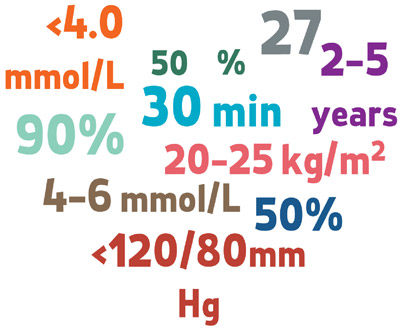Know Your Numbers, Manage Your Risk

Know Your Numbers, Manage Your Risk
Some scary numbers:
9,780 female deaths in 2011 (nearly 27 per day) in Australia
90% of Australian women have at least one risk factor
50% have two or three risk factors
It's not breast cancer or ovarian cancer, it's heart disease, and it's Australia's single biggest cause of death in both women and men.
Now one promising number:
90% of your heart disease risk is 'modifiable", that is based on factors that you can take control of
You can't control your age, or any genetic predispositions you might have, but the majority of heart disease risk factors are things you can do something about:
Smoking, and being exposed to second-hand smoke
Smoking increases your risk of heart attack, stroke and peripheral vascular disease – not to mention lung diseases and a host of cancers. 2-5 years after quitting, your risk of heart attack and stroke drops significantly.
High total blood cholesterol
A healthy total cholesterol level for most adults is below 4.0 mmol/L. Often people with high cholesterol levels show no symptoms, so have your levels checked regularly - even if you have a healthy diet, weight and level of activity.
High blood pressure
Normal blood pressure is usually less than 120/80 mmHg. Have yours checked regularly, and discuss your individual blood pressure target with a doctor. This is especially important if you have diabetes or high cholesterol.
Diabetes
Discuss your risk of diabetes with your doctor and be tested if needed. It's important to take diabetes medicine as prescribed by your doctor, to manage your blood glucose levels. The normal range for blood glucose (when fasting) is about 4-6 mmol/L.
Lack of physical activity
Aim for a total of 30 min. moderately intense activity, such as brisk walking, on most days.
Excess body weight, especially around the stomach
Aim first to prevent excess weight gain, whatever weight you are. Then make long-term, sustainable plans for achieving and maintaining a body mass index (BMI) of 20-25.
Depression and social isolation
Depression can be treated with medical and non-medical therapies. If you're having trouble coping or functioning, act early and talk to a health professional.
Published with the permission of the Jean Hailes Foundation for Women's Health
Tollfree number 1800 JEAN HAILES (532 642) for women seeking further health information www.JeanHailes.org.au
MORE
- Chiropractic Myths & Truths
- Gerard Fogarty Arthritis and Knee Replacement...
- Kym Ellery The ELLERY Eyewear Collection Interview
- Dr Ross Walker The Real Modern Killers Interview
- Shelly Horton Hay Fever Help Interview
- Sebastian VanVeenendaal Royal Rehab's Beach...
- Abigail Koch Family Private Health Insurance...
- Monique Cashion Organic Awareness Month Interview
- Dr Bill Harris Omega-3s Interview
- The Top Ten Health Myths Busted
- Professor Bolin IBD Management a Life-Long...
- Anthia Koullouros Best Cold and Flu Defence...
- Leprosy in NSW
- Julie-Anne Mitchell Go Red for Women Healthy...
- Insight into Chronic Disease Hospitalisations...
- Jeff Chan Mobile Phone Allergies Interview
- How to Conquer Bad Winter Health Habits
- Bad Cholesterol Behind Cancer Spreading In Body
- New Screening Test Recommended To Help Prevent...
- Support For The Rural Nurse Workforce A...
- Kathy Nielsen Ovarian Cancer Australia National...



